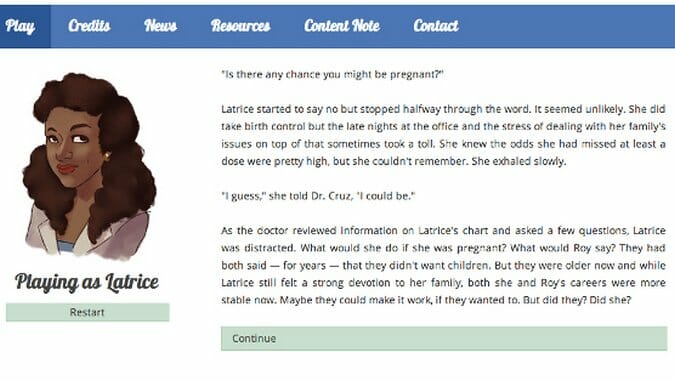Choice: Texas (PC)

Choice: Texas seems unlikely to revolutionize videogames even though it has more to say than most of them. Since going live on May 14, this text-based game about abortion has received very little attention despite numerous 2013 press announcements, including a Christian Post headline that said the game would “encourage” players to get abortions (in the game). Perhaps the game’s lack of self-important and divisive politics has turned some people off — it’s nowhere near as controversial as predicted. In a gaming world where the shock tactics of Metal Gear Solid V: Ground Zeroes and The Walking Dead translate to phony relevance, Choice: Texas is respectfully profound.
Political animals of all stripes might be disappointed when they find that their generalizations about abortion and women aren’t confirmed in Choice: Texas. In the vein of the underrated 9.03m, Choice: Texas avoids both advocacy and insensitivity. More universal than a political manifesto, the game is a reminder that humans are defined by their response to struggle. Choice: Texas emphasizes that a pregnant woman’s decision — as well as the responses of family and friends — is guided by conflicting emotions, practical concerns, and spiritual questioning, not by the philosophical ramblings of loudmouths in the U.S. abortion debate.
Although developers Carly A. Kocurek, Allyson Whipple, and Grace Jennings plan on adding three more protagonists (only two are available now), Choice: Texas already provides more insight into abortion than anything I’ve seen from a fictional source, including Mike Leigh’s objective and moving Vera Drake. Like Vera Drake, Choice: Texas shares human perspective and experience, but the game trumps the movie when it comes to the process of decision making. As either career woman Latrice or young bartender Leah, you make choices and second-guess those choices multiple times as the emotional and economical stakes evolve. By treating choice as a process of revisiting and revising thoughts, the gameplay is powerful despite the simplicity of clicking links.
Choice: Texas is as much about privacy, work, family, and religion as it is about choice. When playing as Latrice, the passion of forging a career is central. Latrice’s workplace serves both as a reality check that the world turns with or without you and as a critique of our society’s contempt for privacy. Pregnancy is presented as a unique challenge of negotiation in the workplace that reflects general worker anxiety caused by prying capitalist eyes. As Latrice, you not only grapple with the decision to give birth or have an abortion but also with the social disconnect between careerism and womanhood. These considerations in turn affect the livelihood of Latrice’s family. Although the handling of Latrice’s mother seems contrived in how her health changes based on your decisions, the family conflict results in catharsis, not cynicism.
It’s more challenging playing as Leah, who becomes pregnant after being raped. Even though the text only describes the aftermath (Leah is drugged at her workplace, a bar), the game forces you to come to terms with the violation right off the bat. Thankfully, Choice: Texas doesn’t peddle shock value — the painful beginning of Leah’s story serves a more articulate purpose, addressing our darkest assumptions and, more importantly, going beyond them. For example, the game suggests abortion is not the only credible choice after rape, which is a risky move considering the recent “legitimate rape” controversy in the United States. Even with the consideration of the baby reminding Leah of her trauma, the game presents no hasty conclusions about what she should do.
-

-

-

-

-

-

-

-

-

-

-

-

-

-

-

-

-

-

-

-

-

-

-

-

-

-

-

-

-

-

-

-

-

-

-

-

-

-

-

-









































